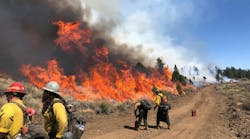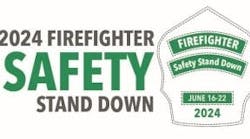Fires. Car accidents. Domestic abuse. Death. There isn’t much a firefighter doesn’t see over the course of his or her career. Then factor in the pressures of the job, changing schedules and interrupted sleep patterns, and it is easy to see that firefighters face many challenges and stressors in their everyday lives.
For volunteers, there is the added fact that most are juggling the fire service and family commitments with a separate full-time job. Time demands become increasingly challenging, which can be further amplified during certain times such as the holidays.
In addition to factors unique to first responders, firefighters and EMTs face the same pressures that all people face, such as concerns about money, relationships and work situations. All of these worries and stressors add up and can have significant consequences on the individual as well as their family members.
Unhealthy reactions
Unfortunately, many firefighters try to deal with stress, trauma or emotional pain in unhealthy ways. Some “self-medicate” using drugs, alcohol, gambling or other addictive behaviors to try to dull their emotions. While this may seem to mask the pain temporarily, these behaviors actually create bigger problems. For others, holding in the pain or not dealing with it effectively can lead to serious health problems such as insomnia, depression, anxiety, chronic stress or post-traumatic stress disorder (PTSD). All of these disorders can have physical ramifications, such as exhaustion, high blood pressure or even heart attack.
Not addressing the root problems and engaging in unhealthy behaviors to avoid confronting the issues can cause problems not just for the individual, but also for their fellow department members and their families at home. The affected individual may show poor judgment, unsafe behavior, clouded thinking or ineffective communication. This could have disastrous consequences on an emergency scene. At home, these behaviors can cause strained familial relationships, which can then result in deeper distress for the affected individuals and their families.
In extreme cases, unchecked mental health issues brought on by trauma, stress and other causes could result in the worst-case scenario – firefighter suicide. The Firefighter Behavioral Health Alliance (FBHA) has collected information on more than 400 cases of firefighter and EMT/paramedic suicides in the U.S. (For further information, see http://www.ffbha.org/ and http://www.nvfc.org/files/documents/ff_suicide_report.pdf.)
The problem is clear, but so is the solution. Firefighter mental health is just not an individual concern. It is an issue facing the entire fire service community, and it must be addressed as such. You may not be experiencing a behavioral health issue, but chances are someone you know is, whether you are aware of it or not. Everyone in the fire service needs to recognize the seriousness of behavioral health concerns and work together to change the culture in their departments to make mental well-being a priority.
In the past, many departments have largely ignored behavioral health, and this has led to a wide range of negative outcomes. In recent years, it has become clear that behavioral health is just as important as physical health and safety. Ignoring the problem is not the answer and can have severe or even deadly results. The stigma attached to behavioral health must be lifted, and resources need to be available to support a firefighter or EMT who needs help. Leadership must take charge of the efforts to make behavioral health a priority, and all members of the department must support these initiatives.
Dealing with stress
Initiative 13 of the National Fallen Firefighters Foundation’s (NFFF) 16 Firefighter Life Safety Initiatives states that, “Firefighters and their families must have access to counseling and psychological support.” The initiative recognizes that the job of an emergency responder brings complications into an individual’s life, especially issues regarding emotional and psychological stress. Resources and a support system must be available to individuals and their families to effectively deal with the stresses they face, and assistance must be available if needed.
Recently, the NFFF unveiled a new model for dealing with exposure to potentially traumatic events. This model recognizes that not all firefighters and EMTs respond in the same way to a traumatic event, and thus the most effective post-exposure follow-up may not be the same for every individual. Resources and training for implementing Life Safety Initiative 13 are available at http://flsi13.everyonegoeshome.com/.
Recognizing that firefighters and their families sometimes need immediate assistance to deal with myriad problems, the National Volunteer Fire Council (NVFC) teamed up with American Addiction Centers to create the National Fire Services Member Assistance Program. Firefighters, EMS personnel and their families can call this toll-free hotline for help dealing with any problems affecting their work or personal life, such as stress, depression, addiction, financial-management difficulties, critical incidents, relationship problems, work-related concerns and more. Trained firefighters and counselors familiar with the fire and emergency services are available 24/7. Call 1-888-731-FIRE (3473) for help or visit www.nvfc.org/help for more information.
A poster promoting the National Fire Services Member Assistance Program hotline and offering other steps department members can take to address behavioral health is included in this issue of Firehouse® Magazine. Hang the poster up at your station to let department members know that help is available and to remind them to make behavioral health a priority.
The NVFC, with support from the U.S. Fire Administration (USFA), has also released resources and training to help departments implement a behavioral health program. These include the report Suicide in the Fire and Emergency Services: Adopting a Proactive Approach to Behavioral Health Awareness and Suicide Prevention and the online training course Preventing and Coping with Suicide in the Fire and Emergency Services. Find these resources and more at www.nvfc.org.
In addition, the focus of the 2013 International Fire/EMS Safety and Health Week was behavioral health. Sponsored by the NVFC and the International Association of Fire Chiefs (IAFC), this awareness week takes place each June to spotlight a critical health and safety issue in the fire service and encourage all personnel to take steps to address the issue. The website www.safetyandhealthweek.org includes a lengthy list of resources and training available to help firefighters and their departments focus on behavioral health.
Need for training
There is a lot a department can do to proactively look after the mental well-being of its firefighters. Leadership should implement mandatory behavioral health training for all members and periodically re-emphasize the key points. Hold workshops where counselors or other qualified entities – such as critical incident stress management (CISM) teams, chaplains and training officers – address potential behavioral health issues and how to recognize signs and symptoms of distress so all personnel know what to look for and how to respond. Encourage fire academies to include at least four hours of behavioral health training for cadets so they know from the start that focusing on behavioral health is important.
It is also important to make an employee assistance program (EAP) available to all department members so that help is available when they need it. If your department does not have this type of program in place, you can use the National Fire Services Member Assistance Program for this purpose. In addition, have effective retirement-planning procedures in place as many firefighters suffer from stress, depression or loss of identity when faced with leaving the fire service after dedicating their lives to it.
With all that firefighters do to protect their communities, it is equally important that we protect each other. Our job is to help people in need, so be there when that person is one of our own.






